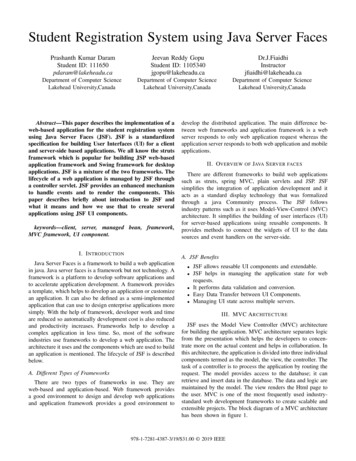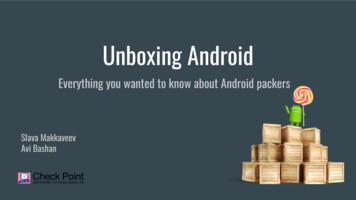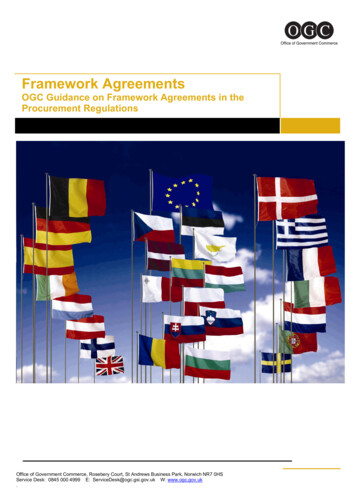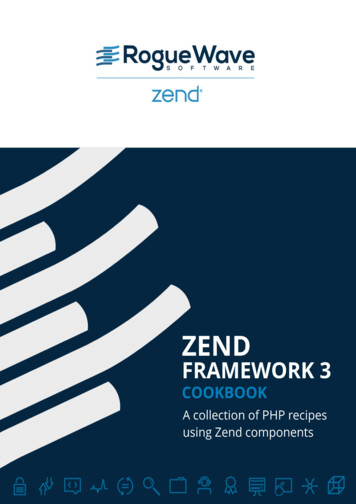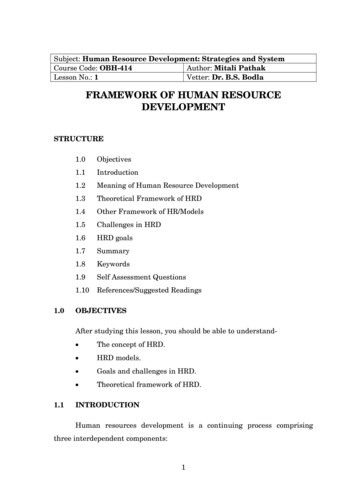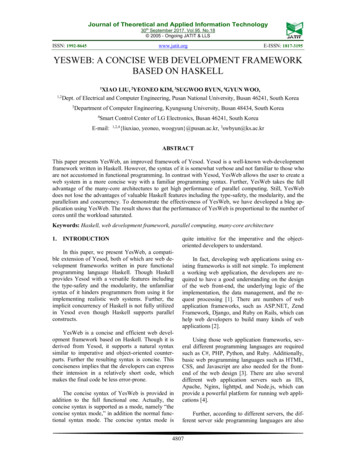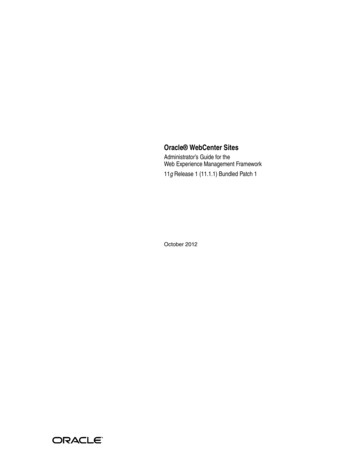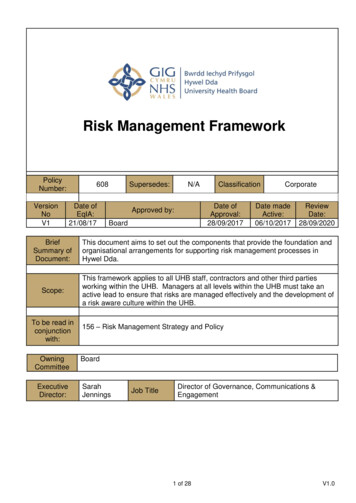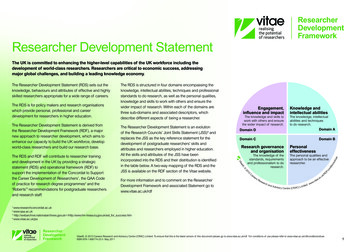
Transcription
ResearcherDevelopmentFrameworkResearcher Development StatementThe UK is committed to enhancing the higher-level capabilities of the UK workforce including thedevelopment of world-class researchers. Researchers are critical to economic success, addressingmajor global challenges, and building a leading knowledge economy.The RDS is for policy makers and research organisationswhich provide personal, professional and careerdevelopment for researchers in higher education.The Researcher Development Statement is derived fromthe Researcher Development Framework (RDF), a majornew approach to researcher development, which aims toenhance our capacity to build the UK workforce, developworld-class researchers and build our research base.The knowledge and skills towork with others and ensurethe wider impact of research.The knowledge, intellectualabilities and techniquesto do research.Domain DDomain ADomain CDomain BResearch governanceand organisationThe knowledge of thestandards, requirementsand professionalism to doresearch.120For more information and to comment on the ResearcherDevelopment Framework and associated Statement go towww.vitae.ac.uk/rdfKnowledge andintellectual abilities The Researcher Development Statement is an evolutionof the Research Councils’ Joint Skills Statement (JSS)4 andreplaces the JSS as the key reference statement for thedevelopment of postgraduate researchers’ skills andattributes and researchers employed in higher education.All the skills and attributes of the JSS have beenincorporated into the RDS and their distribution is identifiedin the table below. A two-way mapping of the RDS and theJSS is available on the RDF section of the Vitae website.Engagement,influence and impact ,aeVitThe RDS and RDF will contribute to researcher trainingand development in the UK by providing a strategicstatement (RDS) and operational framework (RDF) tosupport the implementation of the Concordat to Supportthe Career Development of Researchers1, the QAA Codeof practice for research degree programmes2 and the‘Roberts’3 recommendations for postgraduate researchersand research staff.The RDS is structured in four domains encompassing theknowledge, intellectual abilities, techniques and professionalstandards to do research, as well as the personal qualities,knowledge and skills to work with others and ensure thewider impact of research. Within each of the domains arethree sub-domains and associated descriptors, whichdescribe different aspects of being a researcher.0PersonaleffectivenessThe personal qualities andapproach to be an effectiveresearcher.FconditionsofuseThe Researcher Development Statement (RDS) sets out theknowledge, behaviours and attributes of effective and highlyskilled researchers appropriate for a wide range of careers.DCa/Rre.ukercasRe.eseitaw.varcwwh an.ded AdLimitvisory Centre tp://webarchive.nationalarchives.gov.uk/ /http:/www.hm-treasury.gov.uk/set for entFrameworkVitae , 2010 Careers Research and Advisory Centre (CRAC) Limited. To ensure that this is the latest version of this document please go to www.vitae.ac.uk/rdf For conditions of use please refer to www.vitae.ac.uk/rdfconditionsofuseISBN 978-1-906774-23-3 May 20111
Domain A: Knowledge and intellectual abilitiesThis domain relates to the knowledge and intellectual abilities needed to be able to carry out excellent research.Sub-domainSub-domain summaryJSS1. Knowledge baseKnowledge of:1. Subject knowledge2. Research methods –theoretical knowledge3. Research methods –practical application4. Information seeking5. Information literacy andmanagement6. Languages7. Academic literacy andnumeracyThe area of research, the advances within it and its relationships with other research areasThe methods and experimental techniques appropriate for research designSources of information, bibliographic software and other information technologiesLiteracy and numeracy skills and language abilities appropriate for researchA3A4B6C2C3C4E1Behaviour:Makes original contributions to knowledgeIdentifies, applies and develops methods and experimental techniques appropriate for research projectsConducts effective and comprehensive information searchesRecords, manages and handles information/data using appropriate bibliographic software and other information technologies2. Cognitive abilitiesBehaviour:1. Analysing2. Synthesising3. Critical thinking4. Evaluating5. Problem solvingAnalyses and evaluates findings using appropriate methodsThinks originally, independently and critically; develops theoretical conceptsCritically synthesises information from diverse sourcesEvaluates progress, impact and outcomes of researchRecognises and validates problems; formulates and applies solutions to a range of research problemsA1A2A5A6Attitude:Willing to give and receive constructive criticism3. CreativityBehaviour:1. Inquiring mind2. Intellectual insight3. Innovation4. Argument construction5. Intellectual riskDevelops new ways of working; has novel ideas and realises their potentialIdentifies new trends; creates new opportunitiesDevelops convincing and persuasive arguments to defend researchTakes intellectual risks; challenges the status quoD1D2D3D7*E3Attitude:Takes a creative, imaginative and inquiring approach to researchIs open to new sources of ideas*Denotes where a Joint Skills Statement (JSS) descriptor has been incorporated into different descriptors within the RDFResearcherDevelopmentFrameworkVitae , 2010 Careers Research and Advisory Centre (CRAC) Limited. To ensure that this is the latest version of this document please go to www.vitae.ac.uk/rdf For conditions of use please refer to www.vitae.ac.uk/rdfconditionsofuseISBN 978-1-906774-23-3 May 20112
Domain B: Personal effectivenessThis domain contains the personal qualities, career and self-management skills required to take ownership for and engage in professional development.Sub-domainSub-domain summaryJSSB3D5D6D7*1. Personal qualitiesAttitude:1. Enthusiasm2. Perseverance3. Integrity4. Self-confidence5. Self-reflection6. ResponsibilityApproaches research with enthusiasm, passion and confidenceIs resilient and perseveres in the face of obstaclesIs self-reflective; seeks ways to improve performance and strives for research excellenceIs pro-active, independent, self-reliant and takes responsibility for self and othersShows integrity2. Self-managementBehaviour:1. Preparation andprioritisation2. Commitment to research3. Time management4. Responsiveness to change5. Work-life balanceAnticipates and responds to directions and trends in researchPlans, prioritises and conducts research in proactive wayDelivers research projects and results on time and effectivelyDevelops awareness of, and helps to achieve, work-life balance for self and colleagues3. Professional and careerdevelopment1. Career management2. Continuing professionaldevelopment3. Responsiveness toopportunities4. Networking5. Reputation and esteemAttitude:Has a strategic approach to researchHas focus, commitment and ambitionIs flexible and responsive to changeKnowledge of:Career and employment opportunities inside and outside academiaBehaviour:Takes ownership of and manages professional developmentShows commitment to continuing professional development and enhancing employabilityMaintains and develops relevant skills set and experience in preparation for a wide range of opportunities within and outside academiaActively networks for professional and career purposes and seeks to enhance research reputation and esteemD4F1G1G2G3G4*Denotes where a Joint Skills Statement (JSS) descriptor has been incorporated into different descriptors within the RDFResearcherDevelopmentFrameworkVitae , 2010 Careers Research and Advisory Centre (CRAC) Limited. To ensure that this is the latest version of this document please go to www.vitae.ac.uk/rdf For conditions of use please refer to www.vitae.ac.uk/rdfconditionsofuseISBN 978-1-906774-23-3 May 20113
Domain C: Research governance and organisationThis domain relates to the knowledge of the standards, requirements and professional conduct that are needed for the effective management of research.Sub-domainSub-domain summaryJSS1. Professional conductKnowledge of:1. Health and safety2. Ethics and principles andsustainability3. Legal requirements4. IPR and copyright5. Respect and confidentiality6. Attribution and co-authorship7. Appropriate practiceHealth and safety issues, confidentiality and ethical requirements of his/her research fieldThe legal requirements and regulations relating to the area of research and the research environmentThe principles of intellectual property rights (IPR) and copyright issues, as they relate to research, its commercialisation and disseminationOrganisational and professional requirements and environmental impact of researchThe concept of corporate social responsibilityB2B4Behaviour:Respects, acknowledges and attributes the contribution of othersSeeks to protect, where appropriate, the intellectual assets arising from research and to maximise the wider value of research findingsActs with professional integrity in all aspects of research governanceUses institutional/organisational resources responsibly and appropriatelySeeks ways of working in a sustainable mannerAttitude:Respects, upholds and meets professional standards and requirements2. Research managementKnowledge of:1. Research strategy2. Project planning anddelivery3. Risk managementThe contribution of research to the health of disciplines and institutional missionsProject management tools and techniques3. Finance, funding andresources1. Income and fundinggeneration2. Financial management3. Infrastructure and resourcesC1Behaviour:Applies appropriate project management tools and techniquesSets goals and plans and manages resources to deliver resultsEffectively assesses and manages risksEvaluates the effectiveness of research projectsKnowledge of:B5The requirement for research income generation and financial managementMechanisms for funding, the range of funding sources and the processes for making applicationsLocal administrative systems, reporting procedures and infrastructure processesBehaviour:Responsibly manages finances, resources and infrastructures related to researchResearcherDevelopmentFrameworkVitae , 2010 Careers Research and Advisory Centre (CRAC) Limited. To ensure that this is the latest version of this document please go to www.vitae.ac.uk/rdf For conditions of use please refer to www.vitae.ac.uk/rdfconditionsofuseISBN 978-1-906774-23-3 May 20114
Domain D: Engagement, influence and impactThis domain relates to the knowledge, understanding and skills needed to engage with, influence and impact on the academic, social, cultural, economic and broader context.Sub-domainSub-domain summaryJSS1. Working with othersBehaviour:1. Collegiality2. Team working3. People management4. Supervision5. Mentoring6. Influence and leadership7. Collaboration8. Equality and diversityActively works in an inclusive, respectful and constructive way with colleagues, stakeholders and research usersRecognises and acknowledges the contribution of others and own part in team successBuilds relationships in academic and commercial contexts; approachable and interacts constructively with others; manages expectations and resolves conflictSupervises, mentors and develops the potential of less experienced researchers and colleagues through support and adviceLeads, motivates and influences where appropriate; persuades through listening and convincing discussionBuilds and sustains collaborative relationships and works pro-actively to create and develop knowledge with a range of stakeholders, including researchers, funders and usersof researchE5F2F3Attitude:Respects the inclusive and collegial manner in which researchers conduct relationships within and beyond academiaRecognises the potential for working in sustained partnerships with a range of stakeholders to generate new ideas, insights and maximise the potential for wider societal andeconomic impactRespects individual difference and diversity2. Communication anddissemination1. Communication methods2. Communication media3. PublicationKnowledge of:E2Appropriate communication and dissemination mechanisms for different audiencesThe importance of engaging in the processes of publication and dissemination of research results and impactsBehaviour:Communicates effectively in both written and oral modes with a range of audiences formally and informally through a variety of different techniques and mediaActively engages in publication and dissemination of research results and impacts3. Engagement and impactKnowledge of:1. Teaching2. Public engagement3. Enterprise4. Policy5. Society and culture6. Global citizenshipGlobal, organisational, cultural, economic, and environmental contexts, and the wider impact of researchThe social and ethical implications of research, and public attitudes to these issuesThe range of mechanisms to support knowledge transfer and maximise the impact of research in academic, economic and societal contextsB1B7E4Behaviour:Engages with and shares research through research-informed and student-focused teachingContributes to increasing public awareness, engagement and understanding of research and associated impactsIdentifies innovative trends, ideas and applications; is enterprising and entrepreneurial within and beyond academiaWorks collaboratively with all stakeholders to create, develop and exchange research knowledge to influence and benefit policy development, society and the economy;seeks new outlets and promotes the application of research in innovative waysAppreciates and works with diversity and difference in research and educationAttitude:Values the contribution of research to teaching and teaching to researchRecognises the importance of accountability of research with regard to social and economic impacts, internationalisation and global citizenshipResearcherDevelopmentFrameworkVitae , 2010 Careers Research and Advisory Centre (CRAC) Limited. To ensure that this is the latest version of this document please go to www.vitae.ac.uk/rdf For conditions of use please refer to www.vitae.ac.uk/rdfconditionsofuseISBN 978-1-906774-23-3 May 20115
Endorsers of the Vitae Researcher Development Statementat 15 August 2011 are:VitaeResearch StaffDevelopmentAdvisory GroupResearcherDevelopmentFrameworkVitae works with UK higher education institutions (HEIs) to embed professional and career development in the research environment.Vitae plays a leading role in innovating, sharing practice and enhancing the capability of the higher education sector to provideprofessional development and training for researchers.Our vision is for the UK to be world-class in supporting the personal, professional and career development of researchers.Vitae , 2010 Careers Research and Advisory Centre (CRAC) Limited.To ensure that this is the latest version of this document please go to www.vitae.ac.uk/rdf. For conditions of use please refer to www.vitae.ac.uk/rdfconditionsofuseISBN 978-1-906774-23-3 May 2011Vitae is supported by Research Councils UK (RCUK),managed by CRAC: The Career Development Organisationand delivered in partnership with regional Hub host universities
3 htp: /w eb a r ci v .n ol sg uk m- y _f 4 w .vit ae cuk/js The UK is committed to enhancing the higher-level capabilities of the UK workforce including the development of world-class researchers. Researchers are critical to economic success, addressing major global challenges, and building a leading knowledge economy. 2 Researcher Development F ramewok Domain A: Knowledge and intellectual .
